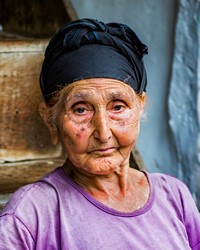Gilaki, Gilani in Iran

Photo Source:
Copyrighted © 2026
Mohammad_Nouri - Shutterstock All rights reserved. Used with permission |
Send Joshua Project a map of this people group.
|
| People Name: | Gilaki, Gilani |
| Country: | Iran |
| 10/40 Window: | Yes |
| Population: | 3,617,000 |
| World Population: | 3,617,000 |
| Primary Language: | Gilaki |
| Primary Religion: | Islam |
| Christian Adherents: | 1.00 % |
| Evangelicals: | 1.00 % |
| Scripture: | New Testament |
| Ministry Resources: | Yes |
| Jesus Film: | Yes |
| Audio Recordings: | Yes |
| People Cluster: | Persian |
| Affinity Bloc: | Persian-Median |
| Progress Level: |
|
Introduction / History
Iran's Gilan province is a plain that lies between the Elburz Mountains and the Caspian Sea. The moisture brought in by the winds of the Caspian Sea becomes trapped by the mountains, creating a damp, warm climate. This fosters the growth of rich forests in the region. Over the years, the Elburz Mountains have kept the inhabitants of Gilan province relatively protected from invaders. Those groups who have succeeded in invading the province have only ruled from afar. Ultimately, Gilan province was returned to Iran in a peace treaty in 1921.
The Gilaki live in northern Iran along the Caspian Sea. They are primarily located in the Gilan province. Their ancient cultural language (also called Gilaki or Gilani) remains unwritten. Today, the educated Gilaki speak Farsi, the national language of Iran. In 1977, a university was built in Rasht, the largest city of Gilan province.
What Are Their Lives Like?
The basis of the Gilaki economy is agriculture. Farmers usually grow rice, tea, and tobacco. They also raise silkworms. In the 1970s, large investments led to major agricultural improvements. Iran began extensive agricultural businesses, especially for the rice industry. The city of Rasht is located in the center of this agriculturally dominated area. It has become a commercial, distribution, and manufacturing hub for the region, producing silk, soap, and glass. Quality roads link Rasht to the rest of Iran, making distribution of these products possible.
The architecture of the Gilan province is unique, primarily because it is a forested area and wooden building materials are in abundance. Specific to this region, verandahs are commonly built on the sides of the wooden houses.
The inhabitants of Gilan province usually identify their own interests with those of Iran. However, they have often been the source of resistance and reform movements. For example, after World War I, the Gilaki demanded national reform and independence for their own region.
What Are Their Beliefs?
Shia practices tend toward the ecstatic. They affirm human free will, and they differ with the Sunni Muslims in matters of law and ceremony. Unlike the Sunnis, Shias believe that Mohammad's successor should be someone in his bloodline, namely Ali. Because some of their leaders have faced violent, martyr's death, Shias understand that a righteous man can be killed by the unrighteous. For this reason, Christ's death on a Roman cross isn't as foreign to them as it is to Sunnis. Only about 15 percent of the world's Muslims are Shia; most of the rest are Sunni.
To live a righteous life, you must utter the Shahada (a statement of faith), pray five times a day facing Mecca, fast from sunup to sundown during the month of Ramadan, give alms to the poor, and make a pilgrimage to Mecca if you have the means. Muslims are prohibited from drinking alcohol, eating pork, gambling, stealing, slandering, and making idols. They gather for corporate prayer on Friday afternoons at a mosque, their place of worship.
What Are Their Needs?
The Gilaki people need to be given the chance to hear the life-changing gospel so they can enjoy life to the full.
Prayer Points
Pray for loving gospel workers to catch a vision for reaching the Gilaki people for Jesus and that in God's sovereign timing the hearts of these people would be open and ready to follow him.
Pray for Jesus movements to bless extended families so the gospel will spread rapidly.
Pray for the spiritual lives of the Gilaki people to become fruitful so others will be drawn to Jesus Christ.